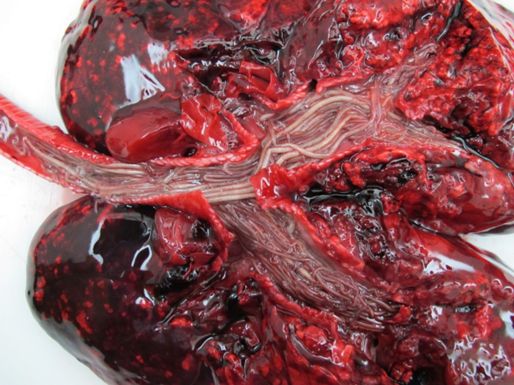
| Project data | |
|---|---|
| Project coordination: | Prof. Prof. h. c. Dr. Ursula Siebert |
| Scientific staff: | Bradley England, Dr. Stephanie Gross, Dr. Kristina Lehnert, Dr. Dominik Nachtsheim |
| Project term: | January 2025 until December 2027 |
| Sponsorship: | Ministry of Agriculture, Nature and Food Quality of the Netherlands |
Project description
Pinnipeds are frequently infected with respiratory nematodes commonly referred to as lungworms. Distinctively, lungworms are particularly prevalent pathogens of young harbour seals (Phoca vitulina) in Northern Europe.

In the Netherlands, young harbour seals frequently strand on human accessible areas and display severe clinical symptoms associated with lungworm infection; as a result, they are often admitted to the nearest rehabilitation centre for treatment. Currently, the number of lungworm patients admitted for rehabilitation is limited for conservation purposes, however, there is a lack of clear criteria regarding the selection of those lungworm patients that should receive care. Critically, there remains an absence of clinical parameters that directly indicate the disease progression; thus veterinarians lack the clinical tools to determine the severity of the infection, and consequently, the likelihood of survival. Furthermore, there is currently insufficient data regarding the fate of rehabilitated lungworm patients post release. Therefore, to prevent potentially unnecessary admissions of lungworm patients, further insights regarding the severity of infection and post-release survival rates are required.
This research project will employ a multiple strategy approach with the overarching aim to develop a triage system for seal rehabilitation centres to assess prognosis for seals either directly at the point of stranding or upon admission. Through comprehensive investigations, this project will provide unprecedented insights into the pathology of lungworm-infected harbour seals, identify clinical parameters associated with survival to and after release, as well as assess the behaviour and survival of seals post release from rehabilitation using telemetry devices. Ultimately, if applicable, this project will result in the development of a prognostic tool to guide the selection of lungworm-infected harbour seals most suitable for rehabilitation. This project, led by the Institute for Terrestrial and Aquatic Wildlife Research (ITAW) in collaboration with three major Dutch seal rehabilitation centres (Aseal Stellendam, Sealcentre Pieterburen and Ecomare), as well as Utrecht University and Wageningen Marine Research, is funded by the Ministry of Agriculture, Nature and Food Quality of the Netherlands.


